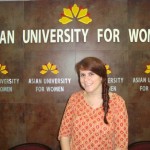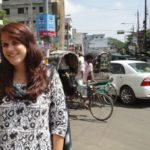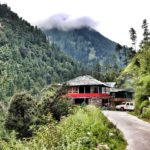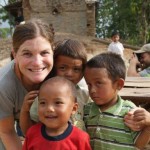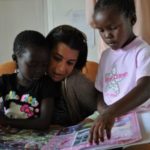Faith Among Frenzy in Bangladesh
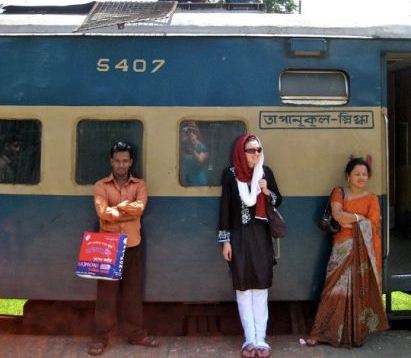
As I stepped off the plane in Dhaka Airport, Bangladesh, it felt like I had just opened an oven door. Frenzied, I laughed to myself, I AM FINALLY HERE! After two days of packing, sharing small talk with my new co-workers, and worrying about what I believed to be the strict, conservative culture of my new home, I realized that I had finally arrived. However, for the first few minutes, nothing could cure my insanity-especially not leaving the airplane for the oven known as Bangladesh.
My American-Nepali group of volunteers lined up in a row against the wall beside the baggage claim. We would have to pay a bribe to reclaim our luggage. I eyed the men in light-and- dark-blue military fatigues. I watched them cradle what seemed to be noxious guns, ready to spit bullets out at any moment. I was crazy and paranoid. My body seemed like it was dominated by animal instincts-I watched, waited, and dripped sweat. The heat was blaring down as the call to prayer sounded. I felt dizzy and could feel the sweat trickling down my legs, forehead, eyelashes, and stomach. I needed to get out of there, but I was in a new country. I was no longer “home.” Where would I go?
Before I left the U.S., I took my first and only human rights class. Like other college students, I was tired of theory. My family and society constantly reminded me of the value of my academic career. Yet, I wondered, what does “knowledge for the sake of knowledge” really mean? And how can compassionate people of any kind believe in this quote? I view myself as someone who values the truth above all and I believe that the truth will reveal goodness. It seems to me that truth and goodness are two sides of the same coin-knowledge is nothing if it doesn’t lead to caring for others. My religion believes that practical knowledge of how to decrease suffering is the pinnacle of humankind.
Faith Among Frenzy in Bangladesh.
In Bangladesh, I teach at the Asian University for Women (AUW), a school that encourages young women to practice their human right to education. After a few months of living in this confusing country, the maniacal part of me seems calmer. Among the chaos and my lack of knowledge and experience, I have only faith in people. And this faith means everything. I can do something with it. I can work with others to uphold the rights of women throughout the world.
But when I first arrived in Chittagong, I was not so excited about Bangladesh. I asked an expatriate here named Lynn what exactly she loved about the country. My everyday life here made it hard for me to understand. On my way to school, I pass fermenting apples, banana peels, sour milk, old shoes, and KaKa, hungry, beady-eyed black crows. Lynn explained that these are remnants from the Bangladeshi War for Independence, which gave rise to buildings, the fall of socioeconomic morality, and the odorous pollution of the city. The leftovers of British colonialism are still present, like the open sewage that runs down the streets. It’s not uncommon to see one man praying on his knees, while another relieves himself in the street only 10 feet away.
Lynn has worked for years as a nurse and felt that God had called her to continue her work in Bangladesh. I am developing a similar form of faith in my relationships with people.
As time passes, I’m growing to love the little, quiet things about Bangladesh that are so easy to miss. And, I love the loud ones too, which are too loud to even complain about. Day and night, I hear incessant honking or the smash of car windshields or the quiet smack of the rickshaw into the back of my CNG, the Bangladeshi vehicle of choice. I see crumbling buildings, clubfooted men, and a barefoot child in tattered clothes, requesting some of my grocery store-bought food. I cannot forget the lady with a mental disability who leans against the iron fence everyday, dazed and dehydrated, with her legs wide open.
What have I discovered after experiencing my first-day reactions? Chittagong is the rolling hills that spread to the ocean. After three months, I overlook the flip-flops, fabrics, and other trash splattered across the Bangladeshi coast. Bangladesh, affectionately referred to as “Bangla”, is the “shy plants” which close into themselves when I graze the tips of their leaves. My Bangladesh is the young women at AUW who have come here for an education-to make their communities safer, healthier, and more free. Bangla is the soft voice on the train, while the Iranian man is screaming and pushing in the sweltering heat. The train conductor whispers to me, “You do not need to fear, ma’am, He is foreigner.”
Bangla is the knowledge that wherever I go, whatever I do, people will stop to help me find my way. “Appa (sister), sit down. You are looking tired.” Or the young boys working in clothing shops, who are more than happy to joke around with the funny foreign girl. Bangla is the fact that every woman I meet invites me over for dinner with her family. It is the brown eyes of a woman with brown skin, hot, with a baby and a basket on her head, shoeless, yet gracefully walking over rocks and glass. She stares at me and then smiles. This beautiful face is my home for a whole year.
I may not understand what exactly Bangladesh is, but I do know that I am an outsider as much as I am the daughter of that Bangladeshi woman on the street, as she quickly pulls my pants up and my shalwar down to cover my partially exposed hip. Ami Bangladesh bhalo bashi.

